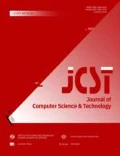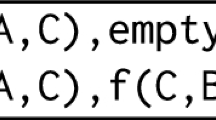Abstract
In this paper, we examine the issue of learning multiple predicates from given training examples. A proposed MPL-CORE algorithm efficiently induces Horn clauses from examples and background knowledge by employing a single predicate learning module CORE. A fast failure mechanism is also proposed which contributes learning effiency and learnability to the algorithm. MPL-CORE employs background knowledge that can be represented in intensional (Horn clauses) or extensional (ground atoms) forms during its learning process. With the fast failure mechanism, MPL-CORE outperforms previous multiple predicate learning systems in both the computational complexity and learnability.
Similar content being viewed by others
References
Lavrač N, Džeroski S. Inductive Logic Programming Techniques and Applications. Ellis Horwood, 1994.
Quilan J R. Learning logical definitions from relations.Machine Learning, 1990, 5(3): 239–266.
Muggleton S H, Feng C. Efficient induction of logic programs. Inductive Logic Programming, Muggleton S (ed.), London, Academic Press, 1992, pp.281–297.
Richards B L, Mooney R J. Automated refinement of first-order Horn-clause domain theories.Machine Learning, 1995, 19: 95–131.
De Raedt L, Lavrač N, Džeroski S. Multiple predicate learning. InProc. Thirteenth International Joint Conference on Artificial Intelligence San Mateo, CA, Morgan Kaufmann, 1993, pp. 1037–1042.
Kijsirikul B, Numao M, Shimura M. Efficient learning of logic programs with non-determinate nondiscriminating literals. InProc. Eighth International Workshop on Machine Learning, San Mateo, CA, Morgan Kaufmann, 1991, pp.417–421.
Kijsirikul B, Numao M, Shimura M. Discrimination-based constructive induction of logic programs. InProc. Tenth National Conference on Artificial Intelligence, San Mateo, CA, Morgan Kaufmann, 1992, pp.44–49.
Zhang X, Numao M. Efficient multiple predicate learner based on fast failure mechanism. Technical Report 95TR-0022, Dept. of Computer Science, Tokyo Institute of Technology, Tokyo, Japan, 1995.
Zhang X, Numao M. An efficient approach for discovering knowledge from multiple databases.Chinese Journal of Advanced Software Research 1998, 5 (1).
Leon Sterling, Ehud Shapiro. The Art of Prolog. The MIT Press, 1986.
Gordon D F, Desjardins M. Evaluation and selection of biases in machine learning.Machine Learning, 1995, 20: 5–22.
Silverstein G, Pazzani M. Relational clichés: Constraining constructive induction during relational learning. InProc. of Eighth International Workshop on Machine Learning, Morgan Kaufmann, 1991, pp.203–207.
Author information
Authors and Affiliations
Corresponding author
Additional information
Zhang Xiaolong received his B.S. and M.S. degrees in computer science from Northeastern University, China in 1985 and 1988 respectively. He has been a lecturer in Wuhan Iron and Steel University. He is currently a Ph.D. candidate in Dept. of Computer Science, Tokyo Institute of Technology. His research interests include machine learning, knowledge discovery from database, natural language processing and intelligent software.
Masayuki Numao is an Associate Professor at Dept. of Computer Science, Tokyo Institute of Technology. He received his B.S. degree from Dept. of Electrical and Electronics Engineering in 1982, and his Ph.D. degree from Dept. of Computer Science in 1987, Tokyo Institute and Technology. He was a visiting scholar at CSLI, Stanford University from 1989 to 1990. His research interests include artificial intelligence, global intelligence and machine learning. Numao is a member of Information Processing Society of Japan, Japanese Society for Artificial Intelligence, Japanese Cognitive Science Society, Japanese Society for Software Science and Technology, AAAI and AIUEO.
Rights and permissions
About this article
Cite this article
Xiaolong, Z., Numao, M. An efficient multiple predicate learner. J. of Comput. Sci. & Technol. 13, 268–278 (1998). https://doi.org/10.1007/BF02943195
Received:
Issue Date:
DOI: https://doi.org/10.1007/BF02943195




